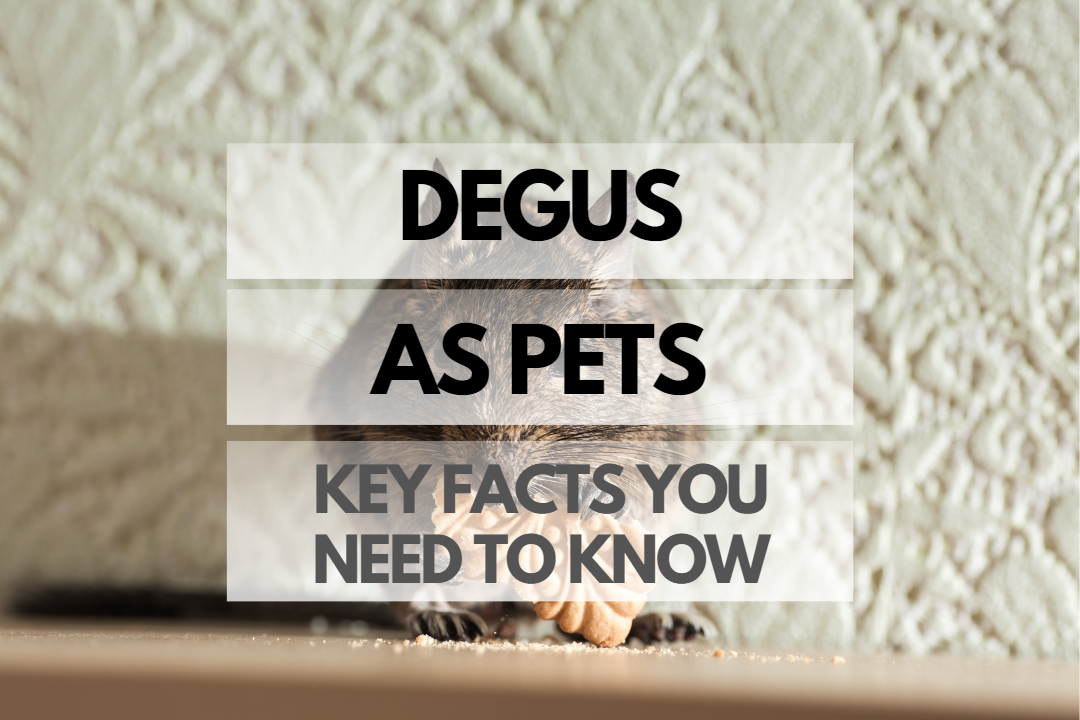Are you considering adding a cute, curious, and social pet to your home? Degus might be just the right fit for you! These delightful little rodents are native to Chile and have become increasingly popular pets around the world. In this article, we will explore everything you need to know about degus, including their care requirements, cost, and compatibility with other animals. Let’s dive in!
Overview of Degus
Before we delve into the details, let’s take a quick look at some of the most important information about degus as pets:
| Rodent Name | Degus |
| Rodent Name (Singular) | Degu |
| Scientific Name | Octodon degus |
| Family | Octodontidae |
| Care Level | Medium |
| Ideal Habitat Temperature | 65-75°F (18-24°C) |
| Personality and temperament | Social, curious, and active |
| Typical appearance and any unique markings | Brown fur with a white belly, brush-like tail, and large, round ears |
| Color Varieties | Mostly agouti (brown) with variations in shading |
| Typical Lifespan | 6-9 years |
| Size | 5-7 inches (13-18 cm) in length, 6-10 ounces (170-300 grams) in weight |
| Primary Diet | Hay, degu-specific pellets, and a limited amount of fresh vegetables |
| Treats | Occasional unsweetened dried fruits or seeds |
| Minimum habitat size | Large multi-level wire cage with solid flooring |
| Ideal habitat | Well-ventilated with hiding places, nesting material, and exercise opportunities |
| Exercise | Exercise wheel, climbing opportunities, and safe, supervised playtime outside of the cage |
| Compatibility with each other | Highly social and should be housed in pairs or small groups of the same sex |
| What animals can they live with? | None, they should be housed only with other degus |
| Typical Cost in US Dollars from Breeders | $50-$100 |
| Typical Cost in US Dollars from Pet Store | $30-$60 |
| Can be found in pounds and animal rescues? | Yes, but less commonly than other rodents |
| Do They Make Great Pets for you? | Depends on individual preferences and commitment to care |
| As Pets Pros and Cons | Pros: Intelligent, social, and unique pets; Cons: Require specialized care, can be noisy, and not suitable for very young children |
| Can stay indoors? | Yes |
| Can stay outdoors? | No |
| Ideal for small spaces like apartments and condos? | Yes, but they still need adequate cage space and exercise |
| Common health issues | Diabetes, dental problems, cataracts, and respiratory infections |
| Breeding considerations | Best left to experienced breeders; requires knowledge of genetics and prenatal care |
How Are Degus as Pets?
Pros and Cons of Pet Degus
Degus can make wonderful pets for the right person, but they do have their pros and cons. Some of the pros of keeping degus as pets include their intelligence, social nature, and unique appearance. They are curious and interactive, which can make them fun and engaging pets. However, they do require specialized care, can be noisy (especially during their active nighttime hours), and may not be suitable for very young children due to their need for gentle handling and potential for nipping if frightened.
How Much Do Degus Cost?
The cost of a degu can vary depending on where you purchase them. From a breeder, they typically cost between $50 and $100, while at a pet store, they may cost between $30 and $60. Keep in mind that the initial cost of the degu is only a small part of the overall expense of owning a pet degu. You will also need to invest in a proper cage, food, bedding, and other supplies, as well as ongoing costs for food, veterinary care, and replacement of items as needed.
Quick Facts About Degus
Degus Lifespan: How Long Do Degus Live as Pets?
With proper care, degus can live between 6 to 9 years. Providing a balanced diet, clean environment, and regular veterinary check-ups can help ensure a long, healthy life for your degu.
Looks and Appearances
Degus have brown fur with a white belly, large round ears, and a brush-like tail. They are often compared to small chinchillas or squirrels in appearance.
Color Varieties
Most degus have agouti (brown) fur with variations in shading. Although there are some slight color differences, there are no widely recognized color varieties like you might find in other rodents.
Size
Degus are typically 5-7 inches (13-18 cm) in length and weigh between 6-10 ounces (170-300 grams). This makes them slightly larger than gerbils but smaller than chinchillas.
Degus Temperament and Personality
Degus are social, curious, and active animals. They enjoy interacting with their human caregivers and other degus. However, they can be somewhat skittish and may nip if they feel threatened or stressed.
Caring For Degus
Are Degus Easy to Care For?
Degus require a medium level of care, which means they are not as easy to care for as some other rodents, but with proper knowledge and commitment, they can make rewarding pets. They have specific dietary, environmental, and social needs that must be met to ensure their health and happiness.
Habitat
A degu’s habitat should be a large multi-level wire cage with solid flooring, well-ventilated with hiding places, nesting material, and exercise opportunities such as a solid exercise wheel, climbing branches, and platforms. The cage should be placed in a quiet, draft-free area away from direct sunlight and extreme temperature fluctuations.
Indoor or Outdoors?
Degus should be kept indoors, as they are sensitive to temperature extremes and need a stable, controlled environment to thrive.
Primary Diet For Degus
Degus should be fed a diet primarily consisting of hay, degu-specific pellets, and a limited amount of fresh vegetables. It’s important to avoid feeding them foods high in sugar, as they are prone to diabetes.
Degu Treats
Treats for degus should be given sparingly and consist of occasional unsweetened dried fruits or seeds. Avoid sugary treats to prevent health issues.
Exercise
Provide your degu with exercise opportunities such as a solid exercise wheel, climbing branches, and platforms within their cage. Additionally, safe, supervised playtime outside of the cage is essential for their well-being.
Common Health Issues
Some common health issues affecting degus include diabetes, dental problems, cataracts, and respiratory infections. Regular veterinary check-ups and proper care can help prevent or manage these conditions.
Can Degus Live With Other Animals?
Degus are highly social animals and should be housed in pairs or small groups of the same sex. However, they should not be housed with other types of animals, as this can cause stress and potential harm to all parties involved.
Degu Breeding Considerations
Degu breeding is best left to experienced breeders, as it requires knowledge of genetics and prenatal care. If you are considering breeding degus, it is essential to research and consult with experts to ensure the best possible outcome for both the parents and their offspring.
FAQ for Degus as Pets
1. Are degus friendly?
Yes, degus are friendly and social animals. They enjoy interacting with their human caregivers and other degus, but they can be somewhat skittish. With patience and gentle handling, you can build trust and form a strong bond with your degu.
2. Can degus be housed with other rodents?
No, degus should not be housed with other types of rodents, as this can cause stress and potential harm to all parties involved. They should be housed with other degus, preferably in pairs or small groups of the same sex.
3. How often do degus need to be fed?
Degus should have access to fresh hay and water at all times. They should also be fed degu-specific pellets daily, along with a limited amount of fresh vegetables. Treats should be given sparingly and consist of occasional unsweetened dried fruits or seeds.
4. Can degus be potty trained?
Some degus can be potty trained to use a designated area in their cage for their bathroom needs. By placing a shallow tray filled with a different type of bedding or a litter designed for small animals in a corner of the cage, you can encourage your degu to use it as a bathroom.
5. How often should a degu’s cage be cleaned?
A degu’s cage should be spot cleaned daily to remove soiled bedding and uneaten food. A thorough cleaning, including changing the bedding and disinfecting the cage, should be done every 1-2 weeks, depending on the size of the cage and the number of degus housed in it.
6. Are degus nocturnal?
Degus are diurnal, meaning they are most active during the day. However, they can also be crepuscular, which means they are active during dawn and dusk. This makes them a great option for pet owners who are available during the day to interact with their pets.
7. Do degus need to be bathed?
Degus should not be bathed in water, as this can remove essential oils from their fur and cause stress. Instead, they should be provided with a dust bath, consisting of a shallow dish filled with chinchilla dust or fine sand, to help them maintain their coat and remove excess oils.
8. How do I know if my degu is sick?
Signs of illness in degus may include lethargy, weight loss, excessive thirst, changes in eating habits, difficulty breathing, discharge from the eyes or nose, or any other unusual behavior. If you suspect your degu is unwell, consult with a veterinarian experienced in treating small animals as soon as possible.
Conclusion
Before embarking on the journey of degu ownership, it’s essential to do your research and be prepared for the commitment involved. With proper care, these intelligent and social creatures can make wonderful and rewarding pets for those who are dedicated to meeting their unique needs.
Whether you’re a first-time degu owner or an experienced enthusiast, understanding and providing the appropriate care, environment, and social interaction will ensure a happy, healthy life for your pet degu.

